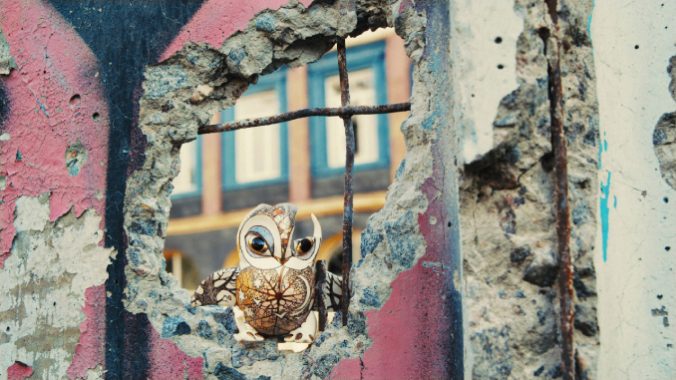Beauty Persists in Porcelain War‘s Brutalized Ukraine

I lived for years in Chicago’s Ukrainian Village. This past fall, I finally visited the Ukrainian National Museum museum down the block. It’s a quiet building nestled in the neighborhood; paintings hang on the first floor and, up the stairs, display cases of intricately painted eggs (pysanky) and history about the Holodomor sit side by side. A museum worker noticed me staring at the tight lines, bright colors and tiny creatures that adorned these Easter eggs, explaining that—as the story goes—the more eggs the Ukrainians painted, the tighter the bonds would grip a world-consuming monster, trapped in its mountains. Now, the monster is closer than ever, so they work overtime. Staving off Russian forces inside the Ukrainian border, its artists take a two-pronged approach: Keep creating the beauty that will be their legacy, and take up arms to ensure they won’t be lost to legacy before their time. This is the hopeful fight fought by Porcelain War, a battlefield art documentary that faces its violent dissonance head-on until resonance emerges.
Slava Leontyev and his wife Anya Stasenko work with porcelain. Slava makes the objects, Anya paints them with quaint natural figures navigating miniature worlds. Slava is also an ex-Special Forces soldier who trains civilians to take up arms to defend their homes against Russian invaders. Throughout Porcelain War, the pair draw connections between destruction and creation—between their fragile yet lasting ceramics and their brutalized yet tenacious country—that erase any doubt between the essential link between them. This poignant, inescapable philosophizing permeates Leontyev and Brendan Bellomo’s nonfiction, giving it a new, entrancing approach to the empathetic intensity of last year’s Ukrainian war docs In the Rearview and 20 Days in Mariupol.
We never doubt the contrast between the couple’s sweet creations and the gritty fight they wage, but Porcelain War milks it for all it’s worth. Placing an exquisite white owl in a bombed-out building or carrying a chibi-like lizard among the training troops displays a bit too much affection for the cute incongruity. The rubble of their cities, shattered across the streets into perverted glass mosaics, is already echoed in their delicate artwork. They quietly assemble Richard Scarry snails, then competently disassemble AK-47s. We don’t need it shoved in our face. In every frame, normal lives struggle to persist through the demands of combat.
Andrey, a fellow painter and Slava’s best friend, recounts the impossible decision to drive his wife and daughters to the Polish border, staying behind as they escape. They’ll have grown up while he’s been apart from them, stranded in this war zone. He’s not painting now. Understandable as that is, he’s an anomaly. Anya and Slava (and their sweet little dog, Frodo) tour their local forest, picking mushrooms from around the landmines and clearing the wilderness of unexploded missiles from Putin’s forces. In the background, beyond the golden fields in which they take reference photos of butterflies and flowers, a dense column of smoke coughs into the sky. A ten-minute drive away, forces defend against a Russian tank attack.
Slava and his trainees mostly contribute to the effort through recon and drone strikes—and we see the full process, from the construction of these little torpedoes to the scoping of targets to the delivery of the bombs. It’s so matter-of-fact as to seem artificial, but then frontline footage shakes the idea from your head. When the troops in Slava’s unit (a milk farmer, furniture sales manager, home contractor, graphic designer, weapon designer and IT worker fill out the force) hit the front lines, their engagement is all the more affecting because of our brief experiences with the doc’s warm, indomitable couple. Their group is attacked while covering the retreat of some infantry, which we experience with an unsettling immersion. A bodycam sprint across open field, towards a building that’s just been hit with a rocket, is one of the most heart-pounding moments of the war I’ve seen caught on tape.
-

-

-

-

-

-

-

-

-

-

-

-

-

-

-

-

-

-

-

-

-

-

-

-

-

-

-

-

-

-

-

-

-

-

-

-

-

-

-

-








































